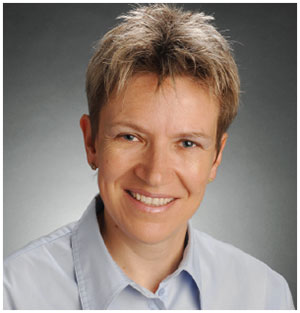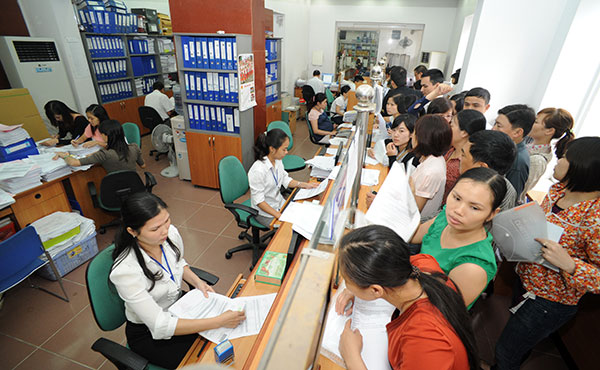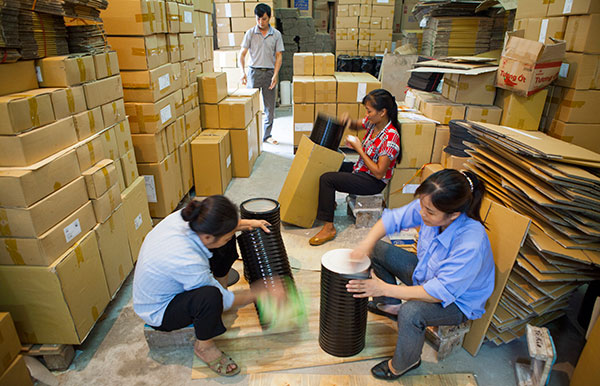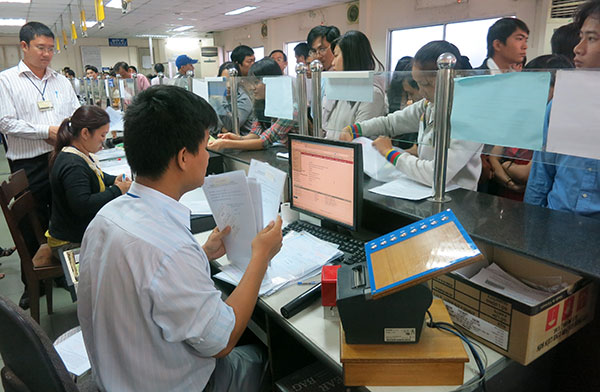Swiss ODA stands by core values
 What are the highlights of Swiss ODA in Vietnam over the last 20 years?
What are the highlights of Swiss ODA in Vietnam over the last 20 years?
Swiss ODA started in 1992 and has since become a cornerstone of our bilateral relations. It has gained a solid reputation thanks to its sustainable development approach and by upholding the Swiss values of professionalism, continuity, and neutrality.
Vietnam is a priority recipient for Swiss ODA and nearly $370 million have been provided to the country into core fields such as local governance, agriculture and food security, economic framework conditions, sustainable trade and investment, public financial management, banking, and supporting small and medium-sized enterprises (SMEs) with a special focus on labour issues, competitiveness, and environmentally-friendly production and consumption.
Two Swiss agencies work on ODA in Vietnam, the Swiss Agency for Development (SDC) and the Swiss State Secretariat for Economic Affairs (SECO). Both are represented by the Swiss Cooperation Office (SDC/SECO) and provide complementary technical and financial assistance to Vietnam in their respective fields of competences.
There are three projects on technical assistance and institutional reform that stand out as prime examples of our work here.
· The first was in public administration reform and SDC was a pioneer in establishing “one-stop-shops”, a concept that has become mainstreamed.
· Another was in the field of institutional capacity building and trade promotion. SECO pioneered in this area by supporting the establishment of Vietnam’s export promotion agency (Vietrade, under the Ministry of Industry and Trade (MoIT) and sent Swiss experts of high reputation to aid during the WTO accession process and current implementation.
· The third was in the field of cleaner production. In cooperation with UNIDO that implemented the project, SECO established the Vietnam Cleaner Production Centre and supported the Vietnamese government and private sector in engaging the concept of cleaner production. The Vietnamese government’s recent Green Growth Strategy is very relevant to this and we think it deserves close attention.

Swiss ODA has pioneered in supporting Vietnam’s public administration reform
Can you elaborate more on the focus of Swiss ODA to Vietnam in the coming time?
Vietnam reached middle-income country status and plans to become an industrialised nation by 2020.
The Swiss Cooperation Programme 2013-2016 takes into account the rapid socio-economic development of the country over the last 20 years, its remarkable success in alleviating poverty, joint project experiences and lessons learned in the past.
For 2013-2016, Switzerland has changed the emphasis to more economic cooperation and development. We have foreseen a robust expansion of the Economic Cooperation and Development Programme (SECO) to support Vietnam in its effort to attain inclusive and sustainable growth. We will also increase our grant budget by 50 per cent to $135 million, of which, SECO will indicatively disburse $110 million and SDC CHF $25 million over the period.
The following five core fields of Swiss Development Cooperation (three of SECO and two of SDC) are covered by the new Vietnam Country Strategy 2013-2016 and the SDC Mekong Region Strategy.
As for SECO, we will focus on sound economic framework conditions to manage the macro-economy, trade integration and improved business environment, on increased competitiveness of SMEs, environmentally-friendly policies and sustainable production and consumption.
SDC will focus on local governance and citizen participation as well as agriculture and food security.
SECO’s portfolio has become stronger and more focused over the time. It has approximately 40 ongoing projects in Vietnam and another dozen in the pipeline, complemented by a dozen of SDC projects.
Vietnam will continue to be a priority for Switzerland with a focus on economic development cooperation. Vietnamese SMEs will see a diversified SECO support programme towards higher-value products and services. Over the next four years, however, Switzerland will gradually decrease its traditional poverty reduction programme.
The Swiss agencies cooperate with a wide range of partners, including ministries, provincial administrators, multilateral organisations, businesses, non-governmental organisations (NGOs), and education institutions.

Vietnamese SMEs will see a lot of support toward producing higher-value products and services
What is behind SECO’s support for Vietnam in terms of business registration?
For many years already, SECO has worked with Vietnam to support reforms targeting the improvement of the business and investment environment. Included are usual costs, the risk of doing business, policy predictability, the enforcement of rights and contracts as well as the compliance with the rule of laws.
Vietnamese businesses face a number of obstacles, including complicated administrative procedures which hurt their performance and stability.
A business registry is the only publicly accessible database providing legally valid information on enterprises. Such information is important for both private and public stakeholders by ensuring legal security, transparency and financial disclosure, which are fundamental to entrepreneurship, innovation, and investment.
The Business Registration Project co-financed by SECO goes beyond the simplification of procedures, but is generating systemic impact. This was behind SECO’s decision to provide substantial financial and technical support (through UNIDO). The project fits our economic and development cooperation objectives to promote and internationalise SMEs by improving the business environment, improving access to finance, and enhancing their competitiveness.
SECO has been cooperating with the Ministry of Planning and Investment to establish a single national business registration system that allows enterprises to register and have online access to legally valid business information, as well as to verify the legitimacy of current and potential business partners and companies. The simplified registration procedures and the complete national outreach are drastically different to the previous business registration systems. It is also designed to minimize risks for businesses and to increase transparency.
The new Business Registration System will be very useful and allow enterprises to find trustworthy information about current and potential partners. It is expected to go online in November 2013.

The Business Registration Project co-financed by SECO goes beyond the simplification of procedures
Have Switzerland’s ODA goals in Vietnam been achieved?
Since 1992, we have realised numerous projects. We regularly evaluate project results to better understand their level of impact. Besides some challenges, the majority of the programmes ha achieved good or very good results and we are capitalising on lessons learned.
A good example out of these programmes was an SDC poverty project involving livestock development in the north (PALD). Switzerland supported poor farmers in 121 communes of nine districts in the northwest region to increase the incomes of 11,500 households and improve the livelihoods of other 68,000 families. We did capacity building and strengthened market linkages.
Another SDC project was in agriculture and rural development, called PS-ARD. In phase one (2008-2011), 55 per cent of those interviewed people living in the northern mountainous province of Cao Bang and 80 per cent of those in the northern province of Hoa Binh reported improved public services. Participatory commune planning was applied to numerous communes throughout the two provinces. The number of involved citizens rose from 10 to 50 per cent and 3,400 commune-level projects benefited 77,000 households overall.
Additionally, SECO has many successful programmes in Vietnam related to our substantive Swiss Economic Development Cooperation Programme.
Since 2011, SECO has cooperated with the MoIT to build up Vietrade as the national export promotion agency and provided technical and financial support. It has recently launched a new phase on trade-related assistance capitalised at $3.32 million and running during 2013-2017. It aims to strengthen decentralized help to local companies in trade promotion and help the Vietnamese government to boost its national import-export strategy.
SECO is also working with the Ministry of Health (NIIM) and the Swiss NGO Helvetas on a $1-million project to promote Vietnam on bio-trade and as a premier source of natural products sourced, processed, and traded in compliance with the bio-trade principles and the Convention on Biological Diversity.
There is also the Green Building Programme 2013-2017 established by the World Bank’s International Finance Corporation that is helping Vietnam’s Ministry of Construction to develop procedures and build capacity in following the new Building Energy Efficiency Code that promotes energy and resource efficiency in the construction sector and reduces pollution and CO2 in cost-effective ways.
Through these and other programmes, Switzerland will continue to contribute to Vietnam’s new green growth strategy and its implementation that aims to change the growth model and adjust people’s living and working habits toward more sustainable production and consumption.
In your view, has Vietnam been effective in its application of Swiss ODA?
Our ODA plans and projects closely follow the development priorities set by the Vietnamese government. We have a sophisticated and well-tested mechanism to strictly manage, monitor, and evaluate how well Swiss ODA is used and implemented in partner countries. We want our ODA to reach and improve the lives of the most needed people. We are also accountable to our parliament for the related Swiss tax-payers money. Generally, we are satisfied with the effectiveness of our funds in Vietnam.
That said, Vietnam should be wary of new challenges posed by ascending to middle-income status and needs to avoid falling into a middle-income trap. In the near future, urgent and pending reforms will need to be pushed through.
One of the greatest challenges we see is the high level of corruption. We hope relevant authorities take swift, stern actions to more seriously combat corruption as Vietnam’s socio-economic gains are at risk and depend on this defeat.
What the stars mean:
★ Poor ★ ★ Promising ★★★ Good ★★★★ Very good ★★★★★ Exceptional
Latest News
More News
- NAB Innovation Centre underscores Vietnam’s appeal for tech investment (January 30, 2026 | 11:16)
- Vietnam moves towards market-based fuel management with E10 rollout (January 30, 2026 | 11:10)
- Vietnam startup funding enters a period of capital reset (January 30, 2026 | 11:06)
- Vietnam strengthens public debt management with World Bank and IMF (January 30, 2026 | 11:00)
- PM inspects APEC 2027 project progress in An Giang province (January 29, 2026 | 09:00)
- Vietnam among the world’s top 15 trading nations (January 28, 2026 | 17:12)
- Vietnam accelerates preparations for arbitration centre linked to new financial hub (January 28, 2026 | 17:09)
- Vietnam's IPO market on recovery trajectory (January 28, 2026 | 17:04)
- Digital economy takes centre stage in Vietnam’s new growth model (January 28, 2026 | 11:43)
- EU Council president to visit Vietnam amid partnership upgrade (January 28, 2026 | 11:00)
















 Mobile Version
Mobile Version